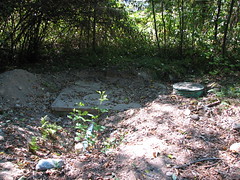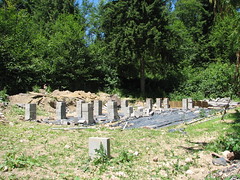
I had a sale fall through recently after the buyer did the soils analysis. The result of the test was
that the property did qualify for a septic system. However it did not qualify for a simple gravity system but an engineered system. There are many people out there who run from an engineered system because they are afraid of the cost or feasibility of such a system. While it is true that engineered systems do cost a bit more, it is not an impossibility nor something that should break your project.

You should never expect to get a gravity system. The vast majority of properties simply do not qualify for this type of system. It is not realistic to expect to get one; you should anticipate and budget for an engineered system. If your property does qualify for a simple system, it’s a bonus.
A
gravity system can be build when the soils are capable of absorbing all the effluent from the septic tank. Wastewater flows from the septic into the drainfield trench just by gravity alone at an irregular pace. You will need four feet of usable soil for this type of system. The estimated cost on this type of system is $7000.
All other types of septic systems require a pump to move the waste around and are called pressurized systems.
A
pressure distribution (aka Pump) system is very similar to a gravity system except that it has a pump that slowly releases the effluent into the drainfield trench at a speed that the soils can handle. They require 2 ½ feet of usable soils. The estimated cost on this type of system is $10,000.
These previous two types of septic systems are what laymen refer to as standard systems and the following are engineered systems.
A
pressure distribution system with pretreatment is the same system as described above except before the effluent gets pumped into the drainfield it gets treated. Building a wastewater treatment system on a septic adds quite a bit of cost. The estimated cost on this is $17,000. Having a wastewater treatment system in your septic also requires more maintenance than if you didn’t. There are many different pretreatment methods you can use, some public domain, some proprietary. So many people will use a mound system instead as an alternative. You only need 18 inches of usable soil for this type of system.
A
mound system doesn’t have a drainfield trench; instead the effluent is pumped into a pile of sand and rock that filters the wastewater before releasing it into the soils. The mound system requires 18 inches of usable soils. The mound system estimated cost is $17,000. It is usually used instead of a pressure with pretreatment because it requires less maintenance. Some people prefer the pressure distribution with pretreatment for aesthetic reasons as they don’t want to look at a mound.
A
mound system with pretreatment is used when the soils are marginal, with as little as 12 inches of usable soils. The system is the same as the mound but with an added wastewater treatment system. Again, this adds cost and maintenance to your system. An alternative to this type of system is the Glendon system. The mound with pretreatment estimated cost is $25,000. But really you wouldn’t put this in when you can do a glendon for much cheaper.
A
Glendon® Biofilter system is a proprietary system. Some soils engineers do not like to do them because they don’t make as much money doing the design as it has to be purchased from the company and if they do a public domain design the engineer gets the money for the design. This system is somewhat like a mound. You have a septic tank that runs a pump into the biofilter. The biofilter is a box of sand and gravel that the wastewater goes through before being released in the soils. The estimated cost on this is $14,000.
So the cost of an engineered system is $4,000 to $15,000 more than a simple pump system. If you use the alternative to the mound with pretreatment, it is only $4,000 to $7,000 more than a simple pump system. If you are trying to build a house on acreage, your total project is hundreds of thousands of dollars, your budget shouldn’t be so tight that a few thousand breaks it.
The cost associated with the engineered systems are: more design fees and more dirt work, as the soils that don’t drain have to be dug out and replaced with something that does.
There are even more types of systems than I have laid out here but these are the most common. You do have options on which type of system will work for you. If you don’t want a pretreatment system, you can do something else instead. I mention the soils depths here for general reference but always consult an actual soils engineer because the soils depth can change due to other factors on the property.
The estimated costs here were taken from a recent estimate I got from a septic engineer for a 3 bedroom septic and are not a guarantee of your actual cost. This will vary from area to area and if you want to know what it actually costs you will need to go get an actual bid from a contractor.
Find more articles tagged with:
Real Estate Washington Land SepticDouglasFir.net

 This website uses google maps and satellite photos to help you find where the land for sale is. You can also sign up on this website to have new listings emailed to you, at no charge or obligation.
This website uses google maps and satellite photos to help you find where the land for sale is. You can also sign up on this website to have new listings emailed to you, at no charge or obligation.






